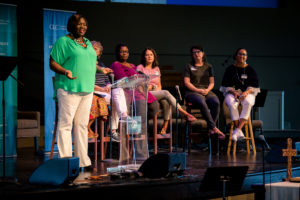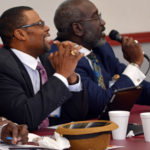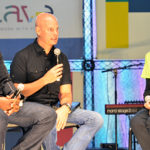GRAND PRAIRIE—In the wake of a turbulent year of clashes between white, black and Hispanic Americans, Christians should build bridges across racial divides, speakers told participants at a Texas Baptist conference on reconciliation.
More than 175 Texas Baptists gathered at First Baptist Church in Grand Prairie for the “One: Unity, Not Uniformity” conference, sponsored by the Texas Baptist Christian Life Commission.
“The Lord placed this event on my heart last spring, because I felt like the church had not done enough to be a part of the solution,” said Kathryn Freeman, director of public policy for the CLC.
The conference sought to equip church leaders and lay members to engage in racial reconciliation in their communities.
“The thing about racial reconciliation is that it’s a process. One conversation or one act of standing up for justice or one act of friendship won’t solve the problem overnight,” Freeman said. “But it can be a step in turning the ship.”
Freeman said she hoped the conference might be the first in a series of fruitful encounters where Christians celebrate their God-given diversity, while bringing truth and reconciliation where previously there has been misunderstanding and conflict.
Being bridge builders in community

Tasha Morrison, founder and president of Be the Bridge, detailed the steps toward reconciliation needed today. She encouraged conference participants to seek reconciliation centered on Jesus.
“The message of Jesus unites us across racial lines. The most thriving communities are racially diverse and racially integrated,” Morrison said. “We must see God at work in every culture, because he is.”
Just as heaven is not segregated, Christians should embrace ethnicities and cultures on Earth, Morrison said. For some, it may mean having dinner with a person of a different ethnicity. For others, it could involve meeting with neighbors and praying for God to move in their community.
Sign up for our weekly edition and get all our headlines in your inbox on Thursdays
Morrison called on Texas Baptists to be bridge builders in their communities by praying for opportunities, examining individual hearts through self-introspection, stepping out of comfort zones and becoming good students and listeners.
Called to the supernatural
Delvin Atchison, director of Texas Baptists’ Great Commission Team, addressed the American Christian identity and the difficulty of separating the two roles in individuals’ lives.
“The great challenge for most of us is we were Americans before we were Christians, … but we must remember, this world is not our home,” Atchison said.
Racial reconciliation may involve overcoming personal reluctance and public resistance, but God’s power can bring about a powerful response and positive results, Atchison said, preaching from Acts 10.
Freeman led a panel discussion that also addressed the work of the church in racial reconciliation.
Scott Venable, global impact pastor for Northwood Church in Keller, noted worshipping and living together with different ethnicities is important but not always natural.
“Cultural barriers get in the way,” Venable said. “We are naturally drawn to people just like us. But when did Jesus call us to do things that were natural? We are called to the supernatural.”
Resounding message
For Chris Culley, a 22-year-old from Plymouth Park Baptist Church in Irving, the conference message resonated deeply.
“As I’ve become aware of racial injustice and systemic racism, I’ve felt a passion God has given me to make progress to pursue racial reconciliation in the church and the community. I want to start conversations for the church to see this as a gospel issue,” Culley said.
Emily Harden, of Ash Creek Baptist Church in Azle, learned about the dynamics of becoming a multi-ethnic church.
“While multi-ethnic is a great ideal to strive for, in practice, it is much more complex than just hiring a staff member of another race and expecting people to assimilate to our existing church culture,” Harden said.
“One ‘tribe’ cannot represent the fullness of the image of God. If I am not pursuing and experiencing diverse relationships, I am missing out.”















We seek to connect God’s story and God’s people around the world. To learn more about God’s story, click here.
Send comments and feedback to Eric Black, our editor. For comments to be published, please specify “letter to the editor.” Maximum length for publication is 300 words.